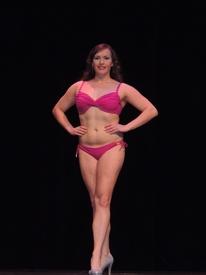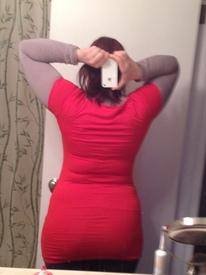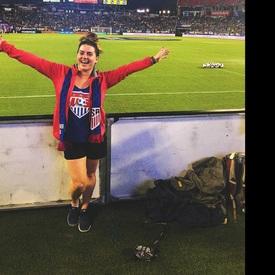10% difference in BF% results?

Misiaxcore
Posts: 659 Member
So my old PT let me get a calliper test done at the the gym. He didn't do it because of schedule conflicts, so another girl did it. She told me she hasn't done too many of them before.
I got my results back as 15%... when I plug in my measurements on Internet calculators I get 25% (the ones that use waist, hips, wrist, forearm).
Sooo could her measurements have been way way off? Or are the calculators I'm using more inaccurate than callipers? Do you need to know the person's weight when calculating with callipers? Because I just realized she didn't get mine, and I lost 26~ lbs since I last saw my PT lol.
I know I can't get the exact number, but I would like something close to work with. My goal is 16% bf, but if I'm actually at 15%... well I don't know anymore, I still can't see my 6 pack xD
Edit to add: My boyfriend said "wtf?" When I told him the results xD And I can pinch fat off my body still... if that info helps.
I got my results back as 15%... when I plug in my measurements on Internet calculators I get 25% (the ones that use waist, hips, wrist, forearm).
Sooo could her measurements have been way way off? Or are the calculators I'm using more inaccurate than callipers? Do you need to know the person's weight when calculating with callipers? Because I just realized she didn't get mine, and I lost 26~ lbs since I last saw my PT lol.
I know I can't get the exact number, but I would like something close to work with. My goal is 16% bf, but if I'm actually at 15%... well I don't know anymore, I still can't see my 6 pack xD
Edit to add: My boyfriend said "wtf?" When I told him the results xD And I can pinch fat off my body still... if that info helps.
0
Replies
-
Yeeeah, 15% would look like either of these:
http://www.leighpeele.com/wp-content/uploads/2010/02/15-percent-body-fat-female1.jpg
My guess is the caliper was done incorrectly, because 15% is very low for a woman who isn't hell-bent on having a low bodyfat%0 -
I agree, 15% sounds to low...how tall are you and what do you weigh?0
-
Yeah, I def don't look like either of those women!
I'm 144lbs and 5'6"0 -
Once upon a time I had like 10% body fat. Way, way back in the day. I worked out for like 2-3 hours a day. I was running half marathons. It was also before I had my daughter. When I was that thin you could literally see every muscle in my stomach. I am no where near that now. I would probably get tested again.0
-
I'll probably get yelled at, but calipers are not accurate. They are only as good as the equipment and the person doing the measurement, and can still be way off if your body composition isn't "standard", whatever that may be.
My PT measured my bodyfat at 22% way back in June. No way was that right, and i think i hurt his feeling by telling him so. I went down to the university and got a DEXA scan (currently being considered the "gold standard" for body comp), and it came in at a whopping 40%. Yeah, ugly number, but much more likely to be accurate, given what i could see in the mirror.
Just had a followup scan, and my bodyfat has dropped substantially. But it's still not 22%. Trainer has reluctantly agreed that perhaps the machine is more accurate than his calipers. 0
Trainer has reluctantly agreed that perhaps the machine is more accurate than his calipers. 0 -
If you already have a scale, buy a Omron Handheld Body Fat monitor. I have that I bought three months ago. It gives me the same reading that my 6 year old body fat monitor scale gives me.
Some trainers use Omron Handheld Body Fat monitors, maybe you need to see if your trainer has one and ask him to test you with it to see what it tells you.0 -
Caliper test results can be heavily scewed by user error. Handheld electronic analyzers results can be heavily scewed by hydration levels.0
-
Caliper test results can be heavily scewed by user error. Handheld electronic analyzers results can be heavily scewed by hydration levels.
I trust my scale and handheld monitor.0 -
Caliper test results can be heavily scewed by user error. Handheld electronic analyzers results can be heavily scewed by hydration levels.
I trust my scale and handheld monitor.
well you shouldn't
Changes in body composition during weight loss in obese subjects in the NUGENOB study: comparison of bioelectrical impedance vs. dual-energy X-ray absorptiometry.
Verdich C et al. Diabetes Metab. 2011 Jun;37(3):222-9.
"RESULTS:
At baseline, BIA significantly overestimated FFM and underestimated FM (by 1-3 kg on average) compared with DXA, and the limits of agreement were wide (mean ± 7-8.5 kg). "
A comparison of dual energy X-ray absorptiometry and bioelectrical impedance analysis to measure total and segmental body composition in healthy young adults.
Lehy S et al. Eur J Appl Physiol. 2011 May 26
"BIA was found to underestimate the percentage total body fat in men and women (p < 0.001). This underestimate increased in men with >24.6% body fat and women with >32% body fat (p < 0.001). Fat tissue mass in the trunk segment was overestimated by 2.1 kg (p < 0.001) in men and underestimated by 0.4 kg (p < 0.001) in women. BIA was also found to underestimate the fat free mass in the appendages by 1.0 kg (p < 0.001) in men and 0.9 kg (p < 0.001) in women. Compared to dual energy X-ray absorptiometry, bioelectrical impedance analysis underestimates the total body fat mass and overestimates fat free mass in healthy young adults."
and James Kreiger's excellent write up on bodyfat testing methods
http://weightology.net/weightologyweekly/?page_id=146
http://weightology.net/weightologyweekly/?page_id=162
http://weightology.net/weightologyweekly/?page_id=175
http://weightology.net/weightologyweekly/?page_id=218
http://weightology.net/weightologyweekly/?page_id=2830 -
Caliper test results can be heavily scewed by user error. Handheld electronic analyzers results can be heavily scewed by hydration levels.
I trust my scale and handheld monitor.
I don't have much faith in handhelds. One day it said I was 18%, next day said I was 14% a few days later it said I was 19%.0 -
Caliper test results can be heavily scewed by user error. Handheld electronic analyzers results can be heavily scewed by hydration levels.
I trust my scale and handheld monitor.
Good for you, see you later!0 -
To the OP,
15% sounds low, you'd have to be trying real hard to get there.0 -
Using differents methodes, I have a body fat between 21% and 30%. I know how frustrating it is since it would be great to have a definitive answer. At the end we will have to use the mirror to know if we are where we want to be or not0
-
I don't have much faith in handhelds. One day it said I was 18%, next day said I was 14% a few days later it said I was 19%.
I check my body fat percentage once a month and I get the same reading from both my scale and handheld monitor.
A scale can give different scale weight readings throughout a week too. I would advise you to check your body fat percentage once a week, bi-weekly or monthly.0 -
Caliper test results can be heavily scewed by user error. Handheld electronic analyzers results can be heavily scewed by hydration levels.
That maybe true , but the difference is not that big. A few % doesn't make a huge difference for an obese person. For athletes that aiming to reduce the last 5-10 lb, it does matter, but that is a different story.
My BF have been measured by a BOD POD machine at my university and my Tanita body scan type scale was less then 2% off from what they have measured. I personally do not care if the measurement is off by 2% or not.
I think it is more important that my scale measurements do not fluctuate. It is fine if it is over or underestimating my BF, but consistent . I personally care much more about the progress, not the actual accurate number.0 -
I don't have much faith in handhelds. One day it said I was 18%, next day said I was 14% a few days later it said I was 19%.
I check my body fat percentage once a month and I get the same reading from both my scale and handheld monitor.
A scale can give different scale weight readings throughout a week too. I would advise you to check your body fat percentage once a week, bi-weekly or monthly.
Consistency =/= accuracy. And both your scale and handheld unit use the same flawed method (BIA).
See Acg67's post above.0 -
Using differents methodes, I have a body fat between 21% and 30%. I know how frustrating it is since it would be great to have a definitive answer. At the end we will have to use the mirror to know if we are where we want to be or not
Pretty much this (except my numbers are between 23% and 26%).0 -
well you shouldn't
I do. Trust what you want to trust.0 -
well you shouldn't
I do. Trust what you want to trust.
not sure what you have against science and accuracy, did you look at the 2 studies i posted?
alsoI’ve heard people make the argument that, while BIA may not be that accurate, it should work fine when tracking change over time. The theory, they say, is that the error should be the same each time you use it.
The problem is that this isn’t true. As I mentioned in the article on hydrostatic weighing, the density and hydration of fat-free mass can change with weight loss. If this can affect the accuracy of hydrostatic weighing for measuring change over time, then you can be sure that the effect on BIA outcomes is going to be significantly larger.
Researchers have looked at the accuracy of BIA for tracking body fat change over time. In one study, the disagreement between BIA and the 4-compartment model ranged from -3.6% to 4.8% for measuring change. This means you could lose 3.6% body fat, but BIA would show no change. Or, BIA could tell you that you lost 8.8% body fat when you really only lost 4%. In fact, in this study, plain ol’ bod mass index (BMI) did just as well as BIA for predicting change in body fat, except for in one person.BIA can be problematic because it’s a prediction based off of a prediction, so the error gets compounded. When you look at group averages for BIA measurements, there tends to be bias, with BIA often underpredicting how much fat you have. As with other techniques, the individual error rates can get high, with some research showing error rates of around 8-9%. In fact, BIA doesn’t do much better than BMI at predicting body fat in some cases. When it comes to measuring change over time, BIA can often underpredict the amount of fat loss, and the estimated change can be off by up to 8%.
http://weightology.net/weightologyweekly/?page_id=2180 -
not sure what you have against science and accuracy, did you look at the 2 studies i posted?
Please respect what I have said. I trust my scale and handheld monitor.0 -
I don't have much faith in handhelds. One day it said I was 18%, next day said I was 14% a few days later it said I was 19%.
I check my body fat percentage once a month and I get the same reading from both my scale and handheld monitor.
A scale can give different scale weight readings throughout a week too. I would advise you to check your body fat percentage once a week, bi-weekly or monthly.
The scale and handheld monitor use the same system. The system itself is inaccurate, it has nothing to do with scale vs handheld, it has to do with BIA in general. I have a scale that measures body fat, and it's laughably bad. 30% one day, 18% the next day, 24% the day after that, it's totally inaccurate and inconsistent. In my experience, the US Navy and the YMCA body fat formulas are much more consistent and accurate than BIA for testing and measuring body fat.0 -
The scale and handheld monitor use the same system. The system itself is inaccurate, it has nothing to do with scale vs handheld, it has to do with BIA in general. I have a scale that measures body fat, and it's laughably bad. 30% one day, 18% the next day, 24% the day after that, it's totally inaccurate and inconsistent. In my experience, the US Navy and the YMCA body fat formulas are much more consistent and accurate than BIA for testing and measuring body fat.
Trust what you want. No one is going to change my mind about my scale and handheld monitor.0 -
Trust what you want. No one is going to change my mind about my scale and handheld monitor.
If you refuse to change your beliefs despite mountains of evidence to the contrary, why should anyone listen to anything you have to say?0 -
If you refuse to change your beliefs despite mountains of evidence to the contrary, why should anyone listen to anything you have to say?
Everyone has a free will. I'm not making a person believe anything that I have said. If they do, they have done so on their own.0 -
If you refuse to change your beliefs despite mountains of evidence to the contrary, why should anyone listen to anything you have to say?
Everyone has a free will. I'm not making a person believe anything that I have said. If they do, they have done so on their own.
question: do you believe the Earth is flat?0 -
question: do you believe the Earth is flat?
I don't have time for mess. I know what we both need to do.0 -
Don't feed the trolls people!0
-
Don't feed the trolls people!
she's not a troll...she's for real... i wish i could say otherwise... smh0 -
Why, of course it is! Also... has the difference in the weight of fat and muscle been factored into this discussion?question: do you believe the Earth is flat?0 -
question: do you believe the Earth is flat?
Well duh, what's next? Are you going to try to tell me we don't live in a geocentric universe?0
This discussion has been closed.
Categories
- All Categories
- 1.4M Health, Wellness and Goals
- 398.2K Introduce Yourself
- 44.7K Getting Started
- 261K Health and Weight Loss
- 176.4K Food and Nutrition
- 47.7K Recipes
- 233K Fitness and Exercise
- 463 Sleep, Mindfulness and Overall Wellness
- 6.5K Goal: Maintaining Weight
- 8.7K Goal: Gaining Weight and Body Building
- 153.5K Motivation and Support
- 8.4K Challenges
- 1.4K Debate Club
- 96.5K Chit-Chat
- 2.6K Fun and Games
- 4.8K MyFitnessPal Information
- 13 News and Announcements
- 21 MyFitnessPal Academy
- 1.6K Feature Suggestions and Ideas
- 3.2K MyFitnessPal Tech Support Questions










